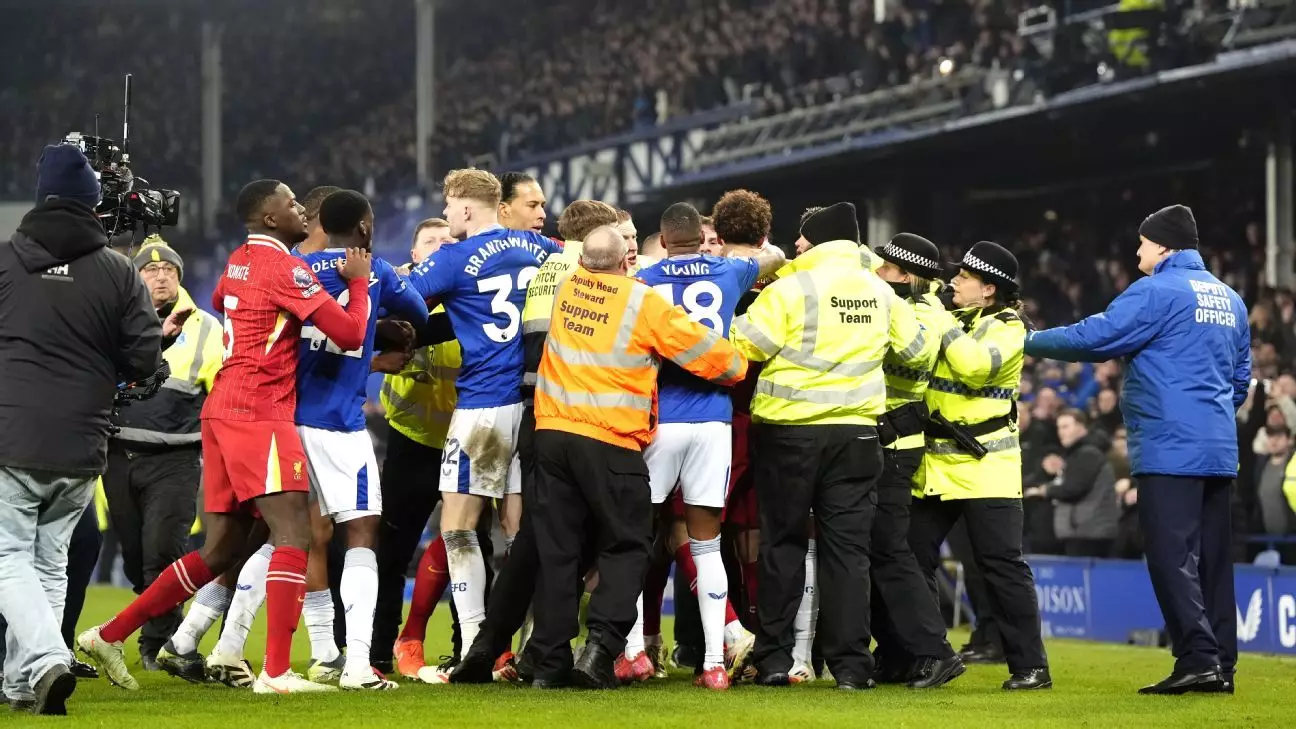The Merseyside derby—a fixture that evokes passion like few others in the world of football—reached new heights of intensity this past Wednesday, as Liverpool and Everton played to a 2-2 draw in a match marred by a post-match brawl. As the last encounter between these historic clubs at Everton’s aging Goodison Park, anticipation for the match was palpable. However, the conclusion left players and coaching staff embroiled in controversy, raising questions about conduct both on and off the pitch.
The match itself was a thriller, with both teams exchanging goals that epitomized the fierce rivalry. Everton’s James Tarkowski scored a dramatic equalizer in the 98th minute, which should have been a moment of jubilation for the home side. Instead, it ignited tensions that had been simmering beneath the surface throughout the match. Tarkowski’s celebration—an act that some considered provocative—inflamed already heightened emotions, particularly among the visiting Liverpool fans who were moments away from witnessing their team’s victory, potentially taking them nine points clear at the top of the Premier League standings.
What followed was a spectacle of chaos, with Liverpool’s Curtis Jones and Everton’s Abdoulaye Doucouré at the center of a brawl that escalated into what can only be described as anarchy. The two players, already booked during the course of the match, found themselves embroiled in physical altercations after Jones confronted Doucouré for seemingly provocative celebrations directed at the Liverpool supporters. The clash quickly spiraled out of control, drawing in both teams and necessitating the intervention of stewards and police.
The involvement of coaching staff in this chaotic scene further complicated matters, with Liverpool’s head coach Arne Slot and assistant Sipke Hulshoff both receiving red cards. This moment of disorder led to Slot’s absence from the post-match media engagements, emphasizing the far-reaching consequences of the altercation.
As the dust settled, Liverpool captain Virgil van Dijk expressed his discontent with referee Michael Oliver’s handling of the match. Van Dijk’s comments underscored a significant narrative in football: accountability of officiating can dramatically influence the tone and outcome of a match. While players need to maintain composure amidst provocation, the balance must be maintained by officials to ensure the game is played fairly and safely. Van Dijk’s assertion that Oliver lost control of the game has resonated with fans and analysts alike, raising pertinent questions that could lead to ongoing scrutiny over the officiating standards in high-stakes matches.
Beyond the immediate chaos, the implications of this match are multifaceted. For Liverpool, the draw interrupted what could have been a commanding lead in the league—an opportunity squandered amid emotional turmoil. Conversely, the draw provided Everton with a crucial point in their battle against relegation, a slight glimmer of hope in an otherwise challenging season. With the return of former manager David Moyes bringing renewed energy to the squad, Everton found themselves on the cusp of a potential turnaround, highlighted by a performance that, while scrappy, showcased their resolve against their archrivals.
In retrospect, the Merseyside derby served as a reminder of football’s unpredictable nature, where triumph and despair coalesce in a single moment. It remains to be seen what fallout this clash will have on both clubs moving forward. As they navigate the intricate balance between rivalry and respect, the echoes of Wednesday’s chaos will certainly linger, reminding all involved that the beautiful game can often take on a darker, uncontrollable side. In a setting that has witnessed countless memorable encounters, this derby may not soon be forgotten for both the right and wrong reasons.


Leave a Reply